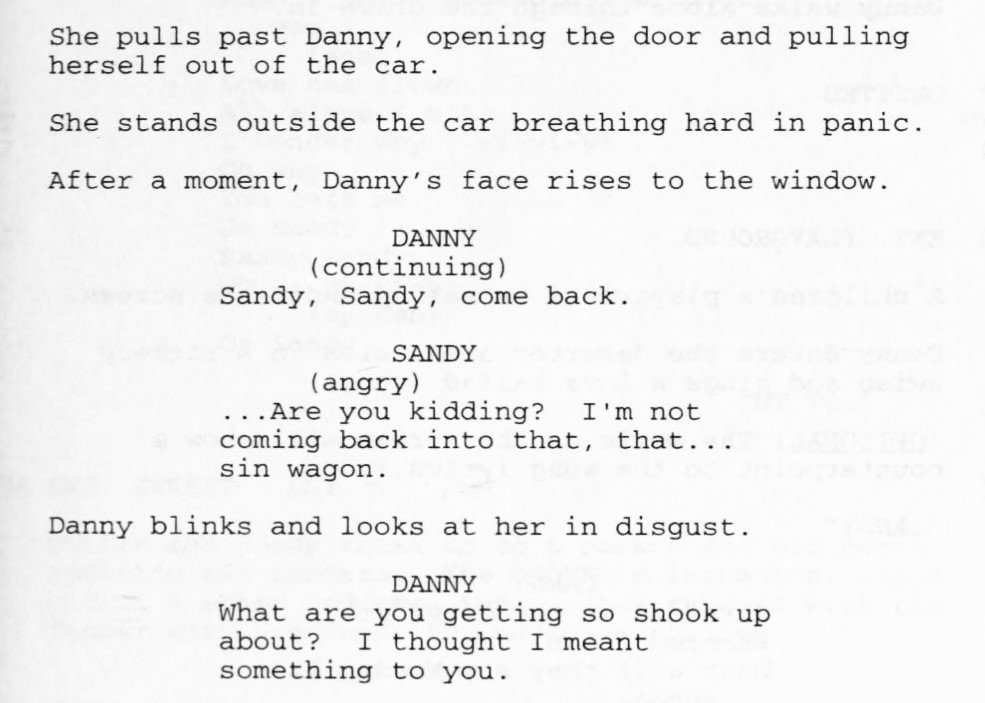MOVIES & LYRICS: How GREASE Inspired "Sin Wagon" by The Chicks
Movies & Lyrics is our new blog series that takes a glance at the influence of screenwriters on musicians and songwriters. With each new post, we’ll take known songs and examine how a particular turn of phrase or thematic element was inspired by a film (and specifically the film’s screenplay).
What is a “Sin Wagon”?
While you won’t find a formal definition in the Merriam-Webster Dictionary, you can find context clues in this script excerpt:
The above is a scene from Grease — Screenplay by Bronte Woodard; Adaptation by Alan Carr; Based on the Original Musical by Jim Jacobs and Warren Casey.
It’s the rockin’ 1950s. Danny gets a little too close for comfort to Sandy in his car at the drive-in movie theater. In a departure from the stage show, Sandy proclaims she’s not going to stay with Danny anymore in this SIN. WAGON.
For Grease’s Sandy, a “Sin Wagon” is something to hightail it away from. Fast.
For Natalie Maines, avid fan of Grease and lead singer of the country trio The Chicks (formerly known as Dixie Chicks), the phrase held gravitas. Enough gravitas to scrawl down in her notebook of song ideas.
The cinematic influence on songwriters/musicians knows no constraints of genre. This week we look at how a beloved movie adaptation of a classic Broadway musical inspired a song on a watershed album in country music.
Fly, The Chicks’ sophomore album, came out in 1999. In the nearly 25 years since its release, its songs of liberation, irreverence and general raising of hell have influenced countless artists both in and outside of the country music sphere. Fly is the album that made Taylor Swift want to take up songwriting.
The Chicks—Natalie Maines and instrumental virtuosos/sisters Martie Maguire and Emily Strayer —have origins in Dallas, Texas as a street corner bluegrass band. The band’s bluegrass sound became somewhat buried when they initially went the big label/commercial route. “Sin Wagon,” the eighth track on Fly, brings it rollicking back.
So, as presented in Woodard and Carr’s screenplay, what is a “sin wagon”?
As established earlier, for Sandy, a sweet, innocent musical theater character, a sin wagon is the devil’s playground, something to get away from.
But a sin wagon as imagined by Natalie Maines in her notebook and turned into a song with the help of her co-writers, Stephony Smith and bandmate Emily Strayer, is something entirely different.
The first time I heard it, it was like hearing punk music for the first time—acoustic, twangy punk. At times, it seemed almost too potent. “Sin Wagon” is a reclamation of sorts, a reclamation of personal agency, of sexuality. Furthermore, it’s a reclamation of a hard bluegrass sound. It seems to be the tale of a woman on a bender. The lyrics are below:
He pushed me 'round
Now I'm drawin' the line
He lived his life
Now I'm gonna go live mine
I'm sick of wastin' my time
Well now I've been good for way too long
Found my red dress and I'm gonna throw it on
'Bout to get too far gone
Praise the Lord and pass the ammunition
Need a little bit more of my twelve ounce nutrition
One more helpin' of what I've been havin'
I'm takin' my turn on the sin wagon
On a mission to make something happen
Feel like Delilah lookin' for Samson
Do a little mattress dancin'
That's right I said mattress dancin'
Praise the Lord and pass the ammunition
Need a little bit more
Of what I've been missin'
I don't know where I'll be crashin'
But I'm arrivin' on a sin wagon
When it's my turn to march up to old glory
I'm gonna have one hell of a story
That's if he forgives me
Oh, lord please forgive me
Praise the Lord and pass the ammunition
Need a little bit more of that sweet salvation
They may take me
With my feet draggin'
But I'll fly away on a sin wagon
I'll fly away on a sin wagon
Perhaps the song is sung by the bad girl, leather jacket-wearing, cigarette-smoking version of Sandy who chooses to literally fly off into the sunset in the “sin wagon” with Danny at the end. After all, “I’ll fly away” is iterated twice at the end of the song…
Either way, it’s inspiring to think the phrase started in a screenplay…
Until next time!


